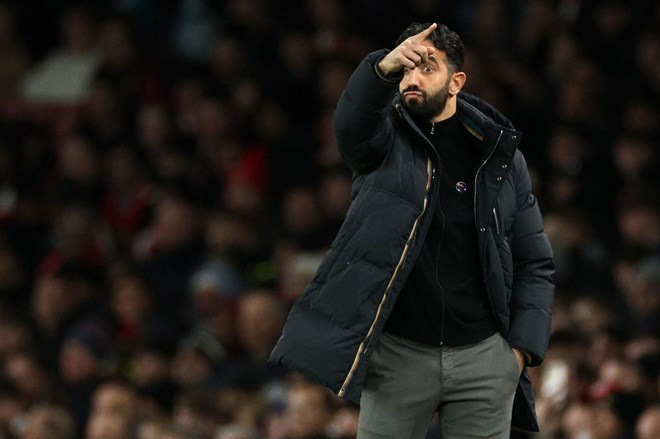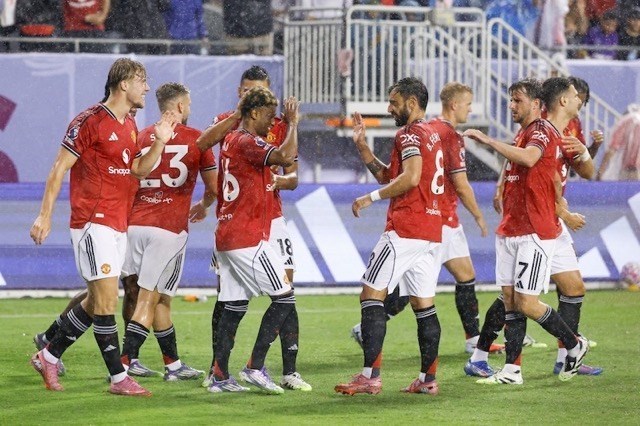At least, coach Ruben Amorim often does not try to make a realistic appearance. Last May, the Portuguese captain stood in the middle of Old Trafford and admitted: "Today, after a disastrous season".
The phrase "disaster season" sounds tighter and colder than any other criticism, describing the achievement of a year that Man United disappointed completely. But the next part of Amorim's message has the opposite color: "I want to tell you that beautiful days are approaching".
According to him, those beautiful days start now. And in fact, they have to come - not only to rescue Amorim himself, who has caused controversy by joking that he wants to stay for 20 years even though his contract only has two years left, but also to revive a struggling team.

Comparisons are sometimes boring, but the example of Erik ten Hag is still there. Ten Hag was given the opportunity to re-work after a disappointing season, spending nearly £200 million in the summer, but was sacked in October.
Amorim is walking on a similar path. Sir Jim Ratcliffe has cut about 450 staff, but this coach's seat remains the same until now. And to rewrite the story, Amorim has also spent nearly £200 million, bringing in three new strikers: Matheus Cunha, Bryan Mbeumo and Benjamin Sesko.
History cannot be repeated forever, but Man United know that better than anyone after their worst season in more than three decades. They still have a journey to the Europa League final, a little old spirit and a little hope for the future. However, everything was overshadowed by a series of disastrous performances in the Premier League.
The 15th position is enough to expose the worrying reality. Under Amorim, the "Red Devils" have only won 27 points - slightly more than the relegation zone, and are far behind expectations.
The image of a team that is often left behind even in matches at Old Trafford is an alarming sign. The argument for Amorim is that the players need more time to adapt to the philosophy and the unique 3-4-3 formation.
In fact, the sacking of Ten Hag was once considered a step to save a top 4 spot. However, it was not until the pre-season tour that Man United began to show signs of being late, that this team was gradually getting used to the already controversial system.
The last two transfer windows have helped Man United bridge some of the gaps in the squad. Patrick Dorgu brought a professional choice on the left wing, although his performance was not really stable.
Despite his acceptance of his current squad, Amorim has not missed Man United's biggest weakness: their ability to score. The team scored just 44 Premier League goals last season, and that's why they brought Cunha, Mbeumo and Sesko.
This trio has all proven their value. Cunha and Mbeumo together contributed 35 goals for Wolves and Brentford, while Sesko scored 13 goals in the Bundesliga for RB Leipzig.
The reform in attack is leaving a significant impact for the names that were once expected to be the future foundation of Man United. Rasmus Hojlund and Joshua Zirkzee are both at risk of being behind.

Marcus Rashford, Jadon Sancho, Alejandro Garnacho and Antony are all in the "blockbuster" category, but are turning in a different direction. At Old Trafford, selling players is always more difficult than buying. And until now, only Rashford has had to leave, or even just on loan.
Man United clearly need more money, not only to balance finances but also because of unfulfilled weaknesses. They still need a better goalkeeper than Andre Onana and some 6 size players - requirements that expose the failure of previous contracts.
If Cunha and Mbeumo prove their worth, it will lead to disruption. Amad Diallo may have to get more accustomed to the right-back role, while Bruno Fernandes has been forced to drop deep in midfield.
Bruno Fernandes' decision to reject Al-Hilal's kind invitation to continue playing at the top was mocked as an illusion, in the context of Man United's decline. But it is that choice that becomes a rare spiritual support. After all, what will a one-man team have if they lose that person?











